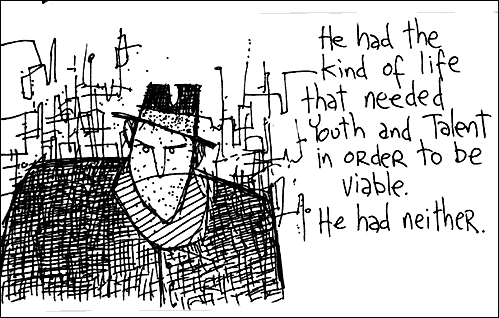Jane Galt expounds, on her lovely new site, Asymmetrical Information, which is not really that new, but gives me a chance to continue my roll of being last to mention stuff.
I was beaten to this by Allan and Elizabeth, in that order, but I don’t mind — really! — because the poem is very good, as undiscovered poems almost never are. The artist can generally be trusted to publish his best stuff. It was awfully sentimental of old Larkin not to have published this:
We met at the end of the party
When all the drinks were dead
And all the glasses dirty:
‘Have this that’s left’, you said.
We walked through the last of summer,
When shadows reached long and blue
Across days that were growing shorter:
You said: ‘There’s autumn too’.
Always for you what’s finished
Is nothing, and what survives
Cancels the failed, the famished,
As if we had fresh lives
From that night on, and just living
Could make me unaware
Of June, and the guests arriving,
And I not there.
Jim says all that one can say. But I digress.
Colby Cosh claims today that P.G. Wodehouse is a greater minor writer than Max Beerbohm, thereby betraying a profound misunderstanding of the principles of minor writerdom. Wodehouse was, to begin with, prolific, while Beerbohm tossed off the occasional slim volume in what he gave the impression was his spare time. The affectation of amateurism is indispensable to minor status. Advantage Beerbohm!
Beerbohm also maintained a sideline in caricature, although perhaps his true sideline was writing, one could never be sure. Wodehouse was a writer strictly. Advantage Beerbohm once again! Beerbohm, at Oxford, won the prize for Latin verse, an almost inconceivably minor activity even in 1890; Wodehouse spent his time at Dulwich (Dulwich!) at boxing and cricket. You make the call.
A Christmas Garland demonstrates Beerbohm’s mastery of parody, the most minor of all prose forms. (Henry James, whom Beerbohm parodied in “The Mote in the Middle Distance,” was once asked his opinion on some matter. He pointed out Beerbohm across the room and said, “Ask that young man. He is privy to all my innermost thoughts.”) And finally I put into evidence this description, from Zuleika Dobson, of the heroine:
Zuleika was not strictly beautiful. Her eyes were a trifle large, and their lashes longer than they need have been. An anarchy of small curls was her chevelure, a dark upland of misrule, every hair asserting its rights over a not discreditable brow. For the rest, her features were not at all original. They seemed to have been derived rather from a gallimaufry of familiar models. From Madame la Marquise de Saint-Ouen came the shapely tilt of her nose. The mouth was a mere replica of Cupid’s bow, lacquered scarlet and strung with the littlest pearls. No apple-tree, no wall of peaches, had not been robbed, nor any Tyrian rose-garden, for the glory of Miss Dobson’s cheeks. Her neck was imitation-marble. Her hands and feet were of very mean proportions. She had no waist to speak of.
If Wodehouse ever wrote anything so dainty, so perfectly structured yet seemingly offhanded, so thoroughly minor, then bring it on.
(Update: Good review, in The New Criterion, of the same biography that got Colby off on this to begin with.)
Mark Riebling takes Al Qaeda’s threats seriously. Warning: Based on actual research!
Daniel Goldhagen says yes. Mark Riebling, more persuasively, says no. You can read it now or be like the other slobs and read it in {link http://www.nationalreview.com/ National Review}} three weeks from now.

Hugh MacLeod has at least one. (Link from Objectionable Content, where Jim shows a few of his favorites.)
I cannot follow a certain kind of historical argument against the war, which runs like this:
We supported Saddam when he was fighting against Iran. We supported the mujahedin when they were fighting the Russians against Afghanistan. Therefore we are hypocritical, or wrong, or both, to war on them now.
Our past support for both the Taliban and Saddam has been exaggerated, but let’s leave the facts aside and consider the structure of this argument. What, exactly, obliges us always to support someone we have supported in the past? The British fought against us in the War of 1812; are they hypocrites to ally themselves with us now?
Or perhaps you don’t care for reductios. Very well: the Russians were our allies in World War II and our enemies after the war: same government, different circumstances. The shift was neither hypocritical nor immoral nor foolish. The Taliban were useful to us when they were fighting the Russians. So was Saddam during the Iran-Iraq War, when Khomeini was a bigger nuisance. The Russians leave, Khomeini dies, things change.
One can argue that supporting Saddam was a bad idea then. One can argue that removing Saddam is a bad idea now. One cannot argue that the two have anything to do with each other.
On a new TV show “a bunch of peace-sign-painting hippies are . . . the bad guys,” and Professor Reynolds posits cultural change: “Hippies never used to be the bad guys.”
I’ve finally found the last man on earth who hasn’t seen Dirty Harry.
